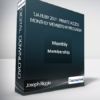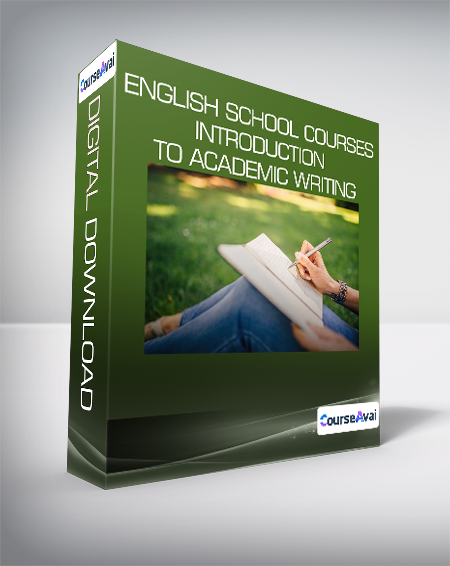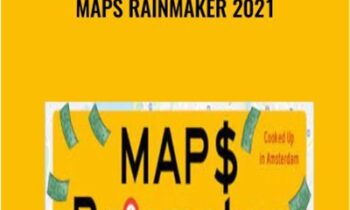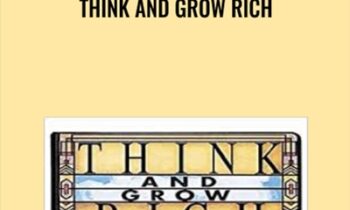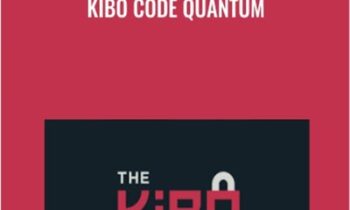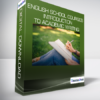$47.00 Original price was: $47.00.$14.00Current price is: $14.00.
Can the course be used in the classroom?
The course works great in the blended classroom which combines online instruction with face-to-face classroom interaction. The course is useful for homework and review.
 Purchase this course you will earn 14 Points worth of $1.40
Purchase this course you will earn 14 Points worth of $1.40Elevate your skills with the English School Courses – Introduction to Academic Writing course, available for just $47.00 Original price was: $47.00.$14.00Current price is: $14.00. on Utralist.com! Browse our curated selection of over 60,000 downloadable digital courses across diverse Business and Sales. Benefit from expert-led, self-paced instruction and save over 80%. Start learning smarter today!
Can the course be used in the classroom?
The course works great in the blended classroom which combines online instruction with face-to-face classroom interaction. The course is useful for homework and review.
Purchase English School Courses – Introduction to Academic Writing courses at here with PRICE $47 $14
English School Courses – Introduction to Academic Writing
Are you tired of using a dull textbook that’s only partly helpful and lacks a clear step-by-step system for learning critical essay writing?
Do you wish to have all the objectives for learning critical essay writing in one place, available 24/7?
In this course, you are going to follow the six essential steps to turn a lousy essay into an OUTSTANDING paper—that gets a top grade.
And you’ll do it through snappy, informative videos and accompanying transcripts, helpful quizzes, useful self-assessments, and writing activities.
“The course is very easy to navigate, the videos are very clear and straightforward, and the supporting materials are abundant and useful. Have a look at these materials if you teach Academic Writing. This is what the future of ESL materials will look like: well-designed, interactive, multimedia rich–and made locally by teachers for teachers.”
Nick Walker, Academic Writing instructor, Ahuntsic College
“If you’re looking for ESL resources for writing, Frank’s materials make an excellent choice. Each aspect of writing is broken down into manageable modules that students can follow at their own pace. Frank is highly knowledgeable in his field and his passion for his subject comes across in his engaging lectures. I used his Academic Writing Course to teach advanced ESL College students, and found this to be a great choice.”
Michelle Baker, ESL Professor, Rosemont College
Your Instructor
Helen Hefter
Helen Hefter
Helen is an English Language teacher at Montmorency college in Montreal.
Chris Rush assisted in course production. He has been teaching business English online since 2012. He has taught over 1,000 students from over 100 countries.
For the past two years, in addition to teaching, he has created online courses to help learners improve their English anytime, anywhere.
Course Curriculum
Introduction
Study Guide
Pre-test your knowledge of academic writing
1. Focus your argument
1. Preview questions
1.1 Introduction: laying the foundation (2:26)
1.2 Specific purpose: distinguish between subject & topic (5:43)
1.3 Debatable thesis: what’s your point? (5:04)
1.4 Literary analysis: introduction (6:14)
1.5 Literary analysis: character, plot, point of view (10:57)
1.6 Literary analysis: setting, style, theme (9:46)
Reading: Narrative, person, distance, author
Reading Quiz
Activity 1.1 Subject vs. topic
Activity 1.2 Literary terms
Activity 1.3 Thesis statements
Self-assessment Worksheet
M1 Quiz_20 points
2. Develop your ideas
2.1 Introduction: gather your material (1:59)
2.2 Do research: know how to read with SQ3R (11:04)
2.3 Take notes: 3 note-taking methods (8:24)
2.4 Think critically: take a stance (8:26)
2.5 Paraphrasing: use your own words (5:57)
2.6 Summarizing: keep it short and sweet (4:29)
2.7 Quoting: direct or indirect – your choice (7:55)
2.8 Use tables: explain the facts (4:33)
2.9 Use graphs and charts: make it visually interesting (5:07)
Activity 2.1 Logical fallacies
Activity 2.2 Take Notes
M2 Quiz_10 points
Self-assessment Worksheet
3. Write concisely
3. Preview Questions
3.1 Introduction: communicating clearly and concisely (2:10)
3.2 Use simple sentences: practice your writing skills (4:58)
3.3 Being clear and brief, or applying the “less is more” principle (4:59)
3.4 Varying your sentence structure is “the spice of life” (5:38)
3.5 Work on paragraph organization: use a topic sentence (7:35)
3.6 Write coherently: make it easy for your reader (5:02)
3.7 Don’t plagiarize: cheating can get you in hot water (7:09)
Activity 3.1: Write concisely
M3 Quiz
Self-assessment Worksheet
4. Organize your ideas
4.1 Introduction: Putting the material together (1:01)
4.2 Use an outline: phrase or sentence (6:59)
4.3 Writing a draft is worth the effort (5:57)
M4 Quiz
Activity 4: Organize your ideas
Self-assessment Worksheet
5. Self-Edit your writing
5.1 Introduction: making it right (1:08)
5.2 Revise: get the overall picture right (4:35)
5.3 Edit: rework your sentences & vocabulary (8:25)
5.4 Proofread: use your own red pen (13:19)
Activity 5: Self-Edit Your Writing
M5 Quiz
Self-assessment Worksheet
6. Present your final paper
6.1 Introduction: making it look great (1:00)
6.2 New Notes: MLA 8th Edition (11:38)
6.3 Revised – Proper Layout: follow the rules (10:34)
M6 Quiz
Activity 6: Present your final paper
Self-assessment Worksheet
Answer key
Film / novel analysis
Lecture A: Why teach literature (8:02)
Lecture B: What literature to teach (8:56)
Lecture C: Using film (7:27)
Lecture D: Getting to talk (7:38)
Lecture E: Getting to write (9:23)
Film Activities
Film Review: IMDB
Film Essay: Casablanca Analysis
Film Essay Outline
Questions about the novel
Oral Evaluation Criteria
Film Analysis: Bladerunner
Six Writing Tips
Debate Project
Debate Project Overvew
Debate Model
Activity 1. Debate Model Practice
Answers Activity 1. Debate model practice
Activity 2. How to write a claim or thesis statement
Activity 3. Research 3 Sources of Information
Activity 4: Build a vocabulary list
Activity 5. VWT outliner
Debate Instructions: Speaking exam
Debate Instructions: Writing exam
Sample Final Essay: Added Sugar Tax
Resources
How to Give a Short Talk
Short Talk Worksheet
Student Discussion Guide
Essay Writing Checklist for Revising/Editing
Works Cited
“What I really liked about the Introduction to Academic Writing is having the choice of following the lesson by watching the video or by reading the text myself. Some people are more visual, while some others would prefer to listen the lesson. So, we have an option to please everyone. The quiz at the end of each section was also very useful, because we can evaluate our understanding and always go back to the points that we were unsure of.”
Rafael, Academic Writing student, Montreal
“All the lectures are very easy to understand; it doesn’t matter your skill level in English writing. You can learn at your own beat; and even if you don’t understand everything right away, you can go back to the courses as many times as you want. That is very helpful!”
Dalie, Academic Writing student, Montreal
Frequently Asked Questions
Who is the course intended for?
This course is aimed primarily at high-intermediate to advanced non-native speakers of English who want to write better critical essays. It is also suitable for native English speakers who want to review the essentials of better essay writing.
When does the start and finish?
The course starts now and never ends! Students have lifetime access to the course. If students are using it as a self-paced course, they decide when they start and finish.
How can students access the course?
Once students have registered using their email and creating a password, they can enter the course online 24/7 in different ways. Students can use any device they own, such as a laptop or mobile, to enter the course. They can also use a school computer. Students don’t download anything since it’s available online.
Can the course be used in the classroom?
The course works great in the blended classroom which combines online instruction with face-to-face classroom interaction. The course is useful for homework and review.
Can the course be used for self-study?
YES! The course can be used on its own to allow students to work at their own pace and meet their individual needs. With its audiovisual feature, it can assist students who have difficulty reading in English.
How many lectures does the course have?
The multimedia course includes 32 audio/visual lectures. Each lecture includes a recorded slide deck as well as an accompanying transcript.
What are the overall objectives of the course?
There are six global objectives for course. Students learn to: 1) focus an argument by developing a thesis statement, 2) develop ideas through doing research, taking notes, and thinking critically, 3) write concisely by composing varied sentences and effective paragraphs, 4) organize ideas by using an outline and writing a draft, 5) self-edit a text by revising, editing and proofreading, and 6) write a properly formatted essay using the MLA style guide.
What are the main pedagogical features of the course?
The course mixes visual and auditory media. Students have the option of listening to the lecture and/or reading the text. It begins with a 30-question pre-test to check learner prior knowledge of the writing process. There is frequent feedback. Each of the six sections contains a self-corrected quiz, a writing activity, and a self-assessment worksheet.
Are group licenses available?
Teachers can order licenses for each of their classes at a special discount price. A minimum of 10 seats is necessary to obtain the special price. Contact Frank Bonkowski at frank@frankbonkowski.com. A free webinar is offered for teachers using the course in their classroom. Frank explains how he uses the course in his own college teaching. He answers any questions teachers may have.
Is there an Affiliate Program available?
Our Affiliate Program allows interested individuals who recommend the course to earn money on each sale. To find out more, contact Frank at
Get English School Courses – Introduction to Academic Writing download
This course is for learners who want to:
Study academic writing at high-intermediate or an advanced level.
Learn critical essay writing for the first time.
Work at your own pace.
Use online learning tools.
This is NOT for learners if you:
Study low-level academic writing.
Are uncomfortable with online materials.
Want to just want to play around.
Readmore: http://archive.is/PsWv2
Purchase English School Courses – Introduction to Academic Writing courses at here with PRICE $47 $14
Cultivate continuous growth with the English School Courses – Introduction to Academic Writing course at Utralist.com! Unlock lifetime access to premium digital content, meticulously designed for both career advancement and personal enrichment.
- Lifetime Access: Enjoy limitless access to your purchased courses.
- Exceptional Value: Benefit from savings up to 80% on high-quality courses.
- Secure Transactions: Your payments are always safe and protected.
- Practical Application: Gain real-world skills applicable to your goals.
- Instant Accessibility: Begin your learning journey immediately after buying.
- Device Compatible: Access your courses seamlessly on any device.
Transform your potential with Utralist.com!
Related products
Business and Sales
= 48 Points
Business and Sales
= 143 Points
Business and Sales
= 73 Points
Business and Sales
= 23 Points
Business and Sales
= 45 Points
Business and Sales
= 93 Points
Business and Sales
= 28 Points

